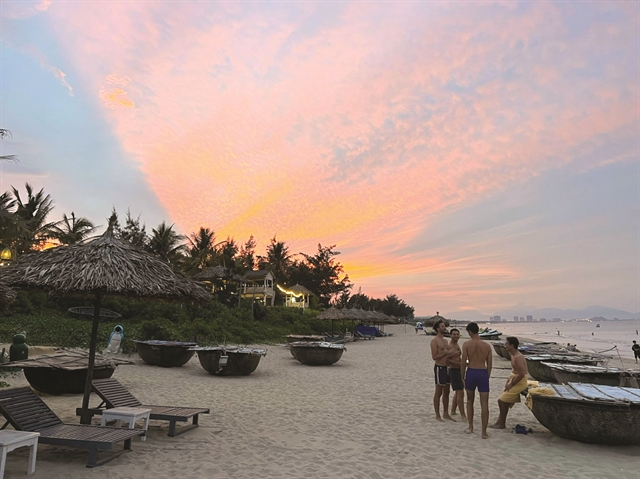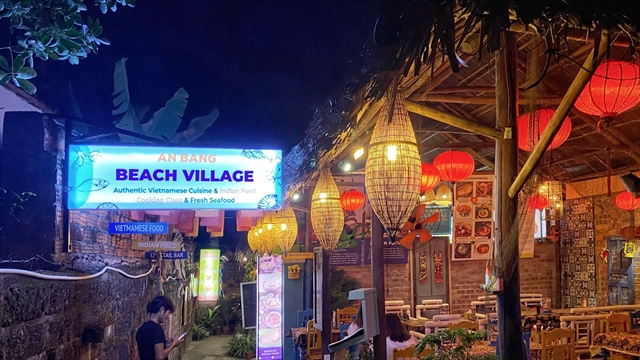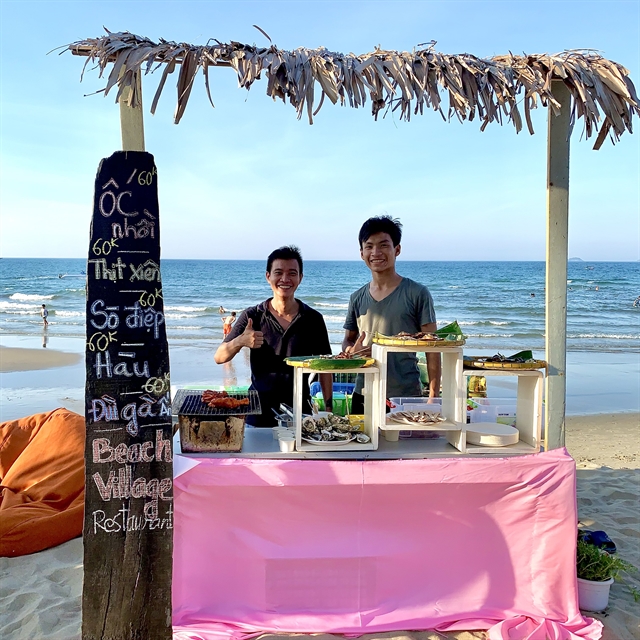Weather:
- Ha Noi 26oC
- Da Nang 27oC
- Ho Chi Minh 26oC
by Công Thành

An Bàng Beach, 5km east of Hội An ancient city, was an isolated coastal rural fishing village in the 1980s when villagers passed the time by walking, boating and taking bicycle rides to the town to do business and socialise.
It was a more innocent time when families measured how well-off they were by the number of jars of sweet potato they had in storage.
However, the fishing and farming-intensive community has emerged as a new tourism attraction with its untouched, pristine sandy beach and laid-back lifestyle.
Born in the village, Lê Thanh Đông, owner of An Bàng beach village restaurant, began his living as a bartender before launching a food service at his home in an alley off Nguyễn Phan Vinh Street, the main road of An Bàng beach.
Đông offers tourists authentic food inspired by the childhood memories of his mother’s cooking.
“My An Bàng beach village eatery is a family business where all members join in with the cooking and serving. The main dishes are based on my mother’s cookery. I set it up as an attraction for gastronomes, using my experience as a bartender,” Đông said.

“It’s a meticulous job where I have to select fresh seafood in the market and from skilled fishermen in the village that I know well.
“The new catch helps the chef cook the best dishes, while fresh fish and oysters are often available from coracles of fishermen returning from Chàm Island sea trips.”
The 42-year-old chef said he was familiar with seafood sellers in An Bàng market, and they always provided him with fresh fish for his restaurant.
He said charcoal grilled fish in banana leaf was one of the two favourite orders, as well as seafood paste spring rolls.
Authentic food
“My mother used to grill fish in a bundle of fresh banana leaves – the dish that fishermen's families cooked after fishing trips in the past. Now I cook it for tourists with my childhood memories, and my sibling has also opened a small restaurant next to my house.”
Chef Đông's father – formerly a fisherman – has retired, but he still makes rice home brew for the restaurant.
“Family service businesses in An Bàng make for a unique tourist magnet outside the Old Quarter of Hội An, a UNESCO heritage site. Travellers can take a short ride on a bicycle or walk to the Old Quarter, in a combined tour of Trà Quế vegetable garden, Cẩm Thanh nipa palm forest and the rural rice farm villages nearby,” Đông said.
An Bàng Village – some100m from the beach – offers a series of options for visitors, including spending homestay or stretching on the massage deck at the beach all day.

Nguyễn Thị Minh, 45, a food street vendor, said An Bàng beach used to be crowded with tourists before COVID-19.
“My snacks earned me well as tourists found rural food delicious. Mỳ Quảng, Cao Lầu (a local noodle speciality) is the best selling. Almost all families in the village turned to service providers since tourism started booming 10 years ago,” Minh said.
“Although offshore fishing has been fading, fishermen still go to the sea on coracles and catch a small amount of fish daily. Seafood is now reserved for tourists, so the early morning catch supplies enough, while the fishermen can rest in the afternoon.
"About 80 per cent of the population joined family-based services including restaurants, homestay, beer bars and sunbathing."
A report from Cẩm An Commune shows that at least 1,000 tourists visited An Bàng beach on the weekends in the summer holidays.

A total of 35 restaurants and 100 villas for rent and homestays have been opened by families in the 4km-long beach village since 2012. Almost all of them were either trained professionally or given a certified course from an education agency in hospitality.
Untouched beach
Lê Ngọc Thuận, head of Quảng Nam Innovation Start-up Club, said almost all staff at restaurants and homestay services had received practice with experienced and senior hotel staff.
“Some youngsters from the village passed training courses working in the hospitality industry during the mass tourism boom in Hội An. They then started family businesses with their experience and skills,” Thuận said.
“About 80 or 90 per cent of villagers join in community tourism-related activities such as cleaning the beach, fishing, and trading and bar services.”
Thuận said he first launched a homestay service at An Bàng, and the village now hosted great cuisine, sunbathing, music performances, surfing and kite flying.
He said villagers decorated the beach as a colourful, fun and festive site for tourists in the summer.
The village now needs investment in infrastructure, waste recycling and treatment, traffic safety signs and assigned zones (bar, sports, food and performance) for tourists, according to Thuận.
An Bàng beach was voted one of the top 25 beaches in Asia by travel website TripAdvisor and one of the top 100 beaches in the world by CNN Summer Travel since it has been promoted as an attractive beach since 2012.
An Bàng Seaside Village, a homestay complex in An Bàng received the ASEAN Homestays 2016 award from the Việt Nam National Administration of Tourism.
A Việt Nam Architecture Association report says that An Bàng Village shows uniquely preserved rural coastal design, while most homestays and restaurants are decorated with recycled material.
It says villagers dismantled old shipwrecks, coracles and furniture to make recycled accommodation and many restaurants.

Villagers also named their homestays with lovely summer flavours such as mango, papaya, avocado, banana, ocean dream and ocean breeze, adding to the fun tropical vibes here.
Hội An City Mayor Nguyễn Văn Sơn said the city had been expanding more tourism zones to ease the overload in the Old Quarter, and An Bàng was one of various options for tourists.
The old town is linked with An Bàng beach by an environment-friendly battery-powered car service.
Chef Đông said the beachfront village naturally lured tourists with its original architecture, hospitality, friendly hosts and constantly available fresh seafood, and stories of the ancient fishing community. VNS

